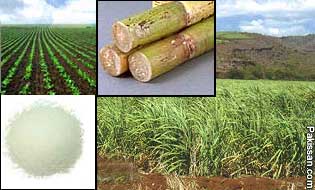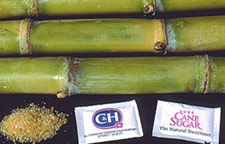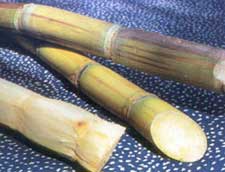|
PSMA refutes allegations
By Iskander M. Khan
The Pakistan Sugar Mills Association (PSMA) refutes the
allegations made in the article entitled "Government acting as
sugar industry's marketing board", published in EBR, Dawn,
dated August 17-22, 2004.
 The
writer of that article seems to have been drawn by revenge
approach due to his inability to contradict the facts
presented by the industry. The entire write-up reflects
jumbled thoughts. The
writer of that article seems to have been drawn by revenge
approach due to his inability to contradict the facts
presented by the industry. The entire write-up reflects
jumbled thoughts.
The problem of surplus sugar stocks has been there for last
four years in succession, which is known to almost all having
some information on trends in sugar segment.
What happens in the event of over-supply of a product as
compared to the domestic demand and its absorption capacity is
a phenomenon which can be understood only by an individual
having the basic knowledge of economics.
After three years of numerous presentations to the three
provincial governments and four federal ministries, the GoP
prudently decided procurement of 500,000 tons of sugar.
It was done in trenches of 100,000 tons each in November and
January last, and 300,000 tons during June and July. This step
was taken due to two reasons. One, to keep strategic stocks as
recommended by the Food and Agriculture Organization (FAO) in
the recent past, at a seminar in Pakistan on "food security".
 The
writer of the article under response seems to be unaware of
it. For the developing countries it is deemed imperative, to
adopt food security system by holding strategic stocks. The
writer of the article under response seems to be unaware of
it. For the developing countries it is deemed imperative, to
adopt food security system by holding strategic stocks.
The government of India holds three million tons of sugar as
strategic stocks. Secondly, it was aimed at ensuring payments
to farmers of their supplies of sugar cane, which were tied
with the sugar stocks lying with the mills, due to extremely
high inventories.
The PSMA accordingly proposed in its communication to the GoP
not to release sugar from the strategic stocks, as the
situation to unload has not yet arrived. Sugar is presently
available in surplus, as evidenced by stocks with the industry
at 1.443 million tons as on July 31, last. Had the writer
known the meaning and significance of the 'strategic stocks',
he would have restrained from projecting his views and
insisting to be right.
Out of the sugar availability of 4.779 million tons, the TCP's
procurement of 500,000 tons is by no means significant. The
main objective of the procurement was aimed at building
strategic stocks, so as to have sugar security and
simultaneously prevent market sentiments from disruption.
The PSMA brought this fact in its suggestions to the GoP. The
industry has to organize on its own to dispose off the balance
4.279 million tons from the aggregate available volume of
sugar.
No one with an enlightened approach can term, in the light of
these facts, 'the government acting as sugar industry's
marketing board'. Such an attribution can be considered,
writing for the sake of self-projection without meaning and
substance.
The sugar industry has agreed to commence next sugar cane
crushing campaign from November 2004, as desired by the
government. The sugar industry would thus prefer to have its
stocks cleared by that time. This preference shall make no
surprise to those who understand and are aware of business
norms.
Our write-up in Dawn appeared in EBR dated 19-25 July, 2004
should have brought up the issue, for sensible contributors to
media, to a logical end. But, contrary to such ethics and
norms, the writer rushed by switch-over to another English
newspaper to reiterate his venom against the sugar industry
and repeat the same in Dawn EBR now under reference.
 No
industry at any place is pampered by any government but, of
course, promotes and supports it in the vital national
economic interest. Without this, the industrialization can
never take place. No
industry at any place is pampered by any government but, of
course, promotes and supports it in the vital national
economic interest. Without this, the industrialization can
never take place.
The writer is unaware about how the industrialization process
takes place, its socio-economic benefits of the industrial
process and as such he has failed to differentiate between
pamper and promotion.
Similarly, he blatantly accused me of playing the role of
mercenary, a ghost writer. He does not even cared to know that
I am the Chairman of the PSMA, perhaps owing to the
frustration caused by our earlier fact-filled response.
One must understand facts are powerful than figments! The
sugar industry holds an impressive record of crushing the
entire crop being supplied to it by farmers.
By the very nature of the crop, a supply to the industry tends
to be on average @ 75 per cent of the total crop size. Balance
is retained for seed, ratoon, uses in juices, animal fodder,
etc.
Not knowing the nature of the crop and its utilization
characteristics, the writer has been adamant on his flimsy
stand on the industry, not processing the entire crop.
The PSMA's annual reports, fortnightly statements, articles in
print media, none has ever reported that the industry was
processing 50 per cent of the sugarcane crop. Had it been so
it would have made unparallel uproars? How one writing
articles can afford to be unaware of this simple information.
His accusation that the sugar industry's effective capacity is
not being utilized. It is due to the crop size trailing behind
and behind all normal estimates. His advocacy for full
capacity utilization refers to import of sugar cane to do so!
Can anyone reconcile with such an idea.
 Similarly,
out of place are his views on expansion of capacity. It was
meant to achieve economic run of sugar industry to 150 days
defined standard period, instead of stretch over to 200 days
plus, as seen in the 11 years from 1986 to 1997, which was a
period of capacity extension on vertical growth. Similarly,
out of place are his views on expansion of capacity. It was
meant to achieve economic run of sugar industry to 150 days
defined standard period, instead of stretch over to 200 days
plus, as seen in the 11 years from 1986 to 1997, which was a
period of capacity extension on vertical growth.
Then the crop size exceeded normal functioning and statutory
requirement to crush the entire sugarcane volume offered to
the industry was a driving force for expansion.
The writer in his fallacy has taken the liberty to object the
tender system of procurement of food items and raises the
question of opium or heroin purchases by tender system to be
legitimate.
There is no parallel between sugar, a food item, and a
legitimate and thoroughly legal trade. It cannot be compared
with opium. Illustration opted is not comparable and as such,
unacceptable.
'Inelastic' feature governing sugar demand has been beyond his
ability to comprehend. Inelasticity in fact refers to no
increase in purchase volume and consumption of a product on
fall of its price and vice-versa.
Sugar is a product with an inelastic demand characteristic,,
as experience of every individual tells by the purchases in
small lots and not more than the normal requirement
irrespective of price. In case of falling prices no one
purchases and consumes more sugar.
The sugar wholesale prices have been in the band of Rs15.89 to
Rs17.92 per kg from January to July 2004, inclusive of an
effective sales tax @ 18 per cent up to June 12, 2004, and
reduced to 15 per cent in the current financial year.
Sugar is a sole exception to have its price fall among all the
food items and even other goods and services. At the same
time, stocks with the industry have surged. What better
evidence one would want to acknowledge about inelasticity of
demand.
The writer has termed the forex reserves at $12 billion as
huge and accused the authorities of having no 'clue as to its
use' and remarks it as lacking skills in managing foreign
exchange.
It reflects nothing in substance tangible but a hollow
approach in accusation. The reserves available are not enough
to meet single year's import bill. Need to hold forex reserves
for economic security, striking better equation in external
trade, protecting value of national currency to have
favourable credit rating, etc., are major factors among many
others.
It is strange to note that the writer keeps support price
mechanism in Pakistan confined to wheat. He is oblivious of
the support mechanism extending to cotton lint, seed cotton,
rice, paddy, besides sugar cane.
A glance at the Economic Survey would give information on it.
Likewise, his observation that there are substitutes to sugar
without mention of even one is nothing but a fallacy.
Substitutes of sugar are yet to be evolved. Had there been
substitutes, sugar would have not been a major food item,
produced by more than a dozen nations and widely traded
globally.
Seeking shelter from some experts, it is claimed that the
industry of Pakistan sells sugar at twice the international
price. Nothing can be big a lie than such a piece of
disinformation.
It is a manifestation of no care to compare price trend in
national and international markets and exportability of its
leading producers. This subject has been explained often at
length and all are well aware of this.
Sugar cane support price and other costs fixed in one form or
other can be much helpful to assess the cost of production.
Besides, published accounts of a number of sugar companies
quoted on the stock market are accessible to study, provided
one has patience and acumen to study and understand.
Likewise, his assertion that sugar is a by-product while
molasses is the mainstay is a whim, having no material support
to it. Sugar has always been a main product and, therefore,
the industry processing it everywhere is identified as sugar
industry. Had molasses been the main product, as asserted, the
industry would have been branded and known as 'molasses
industry'. This is a simple norm.
It is easy to accuse others and more so in an irresponsible
manner as evident from the article by the writer. He is out of
context as is evident from turning guns against the sugar cane
farmers, the government functionaries, besides the industry.
He perhaps feels each stakeholder in sugar sector as his
enemy.
Courtesy: The DAWN
|
Pakissan.com;
|